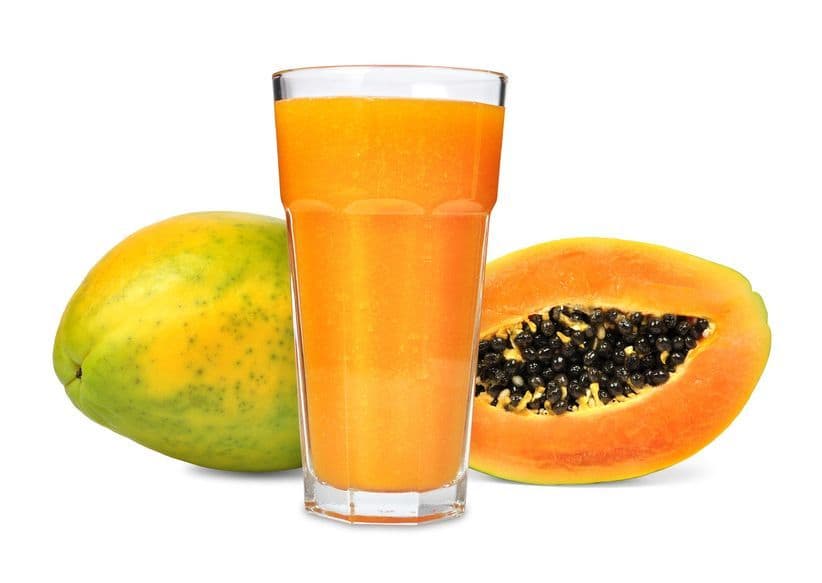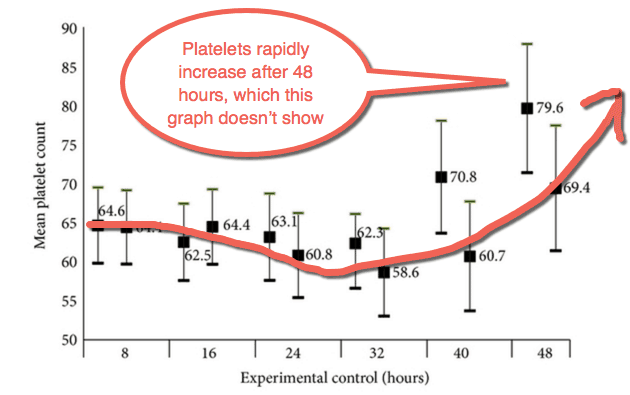
The platelets are specialized blood cells that collect around a wound.
The wound could be a broken blood vessel, or it could be a cut in the skin.
When platelets encounter a wound, they collect together to create a barrier.
This barrier blocks the way for blood to escape and so helps to stop the bleeding.
Without platelets, it’s difficult to stop bleeding.
People have low platelets for many reasons.
This partial list as WebMD says:
- Viral infections, including chickenpox, parvovirus, hepatitis C, Epstein-Barr, mononucleosis, or HIV
- Severe bacterial infection in your blood
- Blood cancer such as leukemia or lymphoma
- A problem with your bone marrow
- Rare disorder called hemolytic uremic syndrome
- Miliary tuberculosis (miliary TB)
- Vitamin B12 or folate (vitamin B9) deficiency
Most of the time, the reasons for low platelets are not evident.
Doctors call low platelets “thrombocytopenia.”
If you have less than 150,000 platelets per milliliter of blood, that’s the diagnosis.
Doctors often blame the spleen for low platelets.
It seems that when platelets are low, the spleen often enlarges at the same time.
The medical theory is that the spleen fills with platelets, and doesn’t let them out.
Since doctors most often blame the spleen, they remove the spleen.
The idea being that the spleen can’t trap the platelets then.
But that doesn’t fix the low platelets.
So the patient just had surgery for really no reason.
I don’t know whether most people should have their spleen removed just because they have low platelets.
Note to self: don’t ever let a doctor remove your spleen just because you have low platelets.
Most of the time, it’s very difficult to know why you have low platelets.
And it’s not just people who can have low platelets.
Dogs sometimes have low platelets.
Cats can sometimes have low platelets.
It’s actually quite common.
And with so many individuals having the issue, we need a solution.
So here’s a solution to low platelets that you need to hear about.
In Sri Lanka as in many tropical places, they have a major problem with mosquito-borne illness.
And example would be dengue fever.
Dengue fever is often not fatal, but it’s certainly a big pain to have.
And it can be very dangerous.
So that’s why they research platelet issues in tropical countries such as Sri Lanka.
Dengue fever results in low platelet count.
Most of the time, dengue fever results in symptoms resembling the flu.
Most of the symptoms eventually go away.
But low platelet count is a very common symptom that hangs on for a while.
It can be life-threatening if the patient gets a cut and they aren’t able to stop bleeding.
Also, nosebleeds may start can’t be stopped.
Or the patient could have bleeding from the anus.
So it’s essential to get the platelets back up and do it quickly.
Luckily, there’s a natural way to raise platelets by two or three times.
 This study is a mouse study.
This study is a mouse study.
But they repeated the study a number of times of humans, and it works just the same way in humans.
Many people say it worked for their dogs who had low platelet count.
I’m about to try it on my dog who has low platelet count for some mysterious reason.
So, in the study, researchers gave a group of mice papaya leaf extract.
They left another group untreated, as a control group for comparison.
By day three, platelets in the test group started to rise.
The measurements for day 21 showed that platelets had quadrupled in the test group.
Red blood cells increased just 50% in the control group.
So clearly there’s a benefit to the papaya leaf extract.
But did the papaya leaf cause any organ damage or other damage?
The researchers found that there was very mild localized damage to the liver.
They found no other changes or problems for the mice who had the papaya leaf treatment.
In light of the liver damage, it is possible that papaya leaf should be used for just short periods of time.
It can probably damage the liver if it’s used in large quantity over a period of time.
Or it is possible that this is something peculiar to mice.
In any event, the liver is able to bounce back from such problems quite rapidly and easily.
Let’s quickly confirm this in a human study:
 This is a very deficient study, because they only reported platelets rising over 48 hours.
This is a very deficient study, because they only reported platelets rising over 48 hours.
It’s difficult to draw appropriate conclusions with a study with such a short duration.
But the researchers were focusing on dengue fever as a cause of the low platelets.
They were specifically studying people who had low platelet counts and a high risk of bleeding out as a complication of the dengue fever.
Since dengue fever doesn’t last that long, the study only looked out to about 48 hours.
The researchers used papaya leaf extract from fresh leaves.
And they found that the papaya leaf extract can increase platelets dramatically.
It was successful even within just 48 hours in humans.
 I have no doubt that if they had continued with the treatment, the results would have continued in that direction.
I have no doubt that if they had continued with the treatment, the results would have continued in that direction.
They might have even reported substantially higher platelet counts as the mice study shows.
There was no evidence of complications reported in the study or in others that I looked at.
It seems that papaya leaf is safe.
It seems that you have to use an extract of papaya leaf or fresh leaves.
Freeze-dried leaves don’t appear to be as effective.
And we don’t really know what’s in it that’s causing the dramatic increase in platelets.
Yet.

http://www.webmd.com/a-to-z-guides/thrombocytopenia-symptoms-causes-treatments
Does Carica papaya leaf-extract increase the platelet count? An experimental study in a murine model
http://www.ncbi.nlm.nih.gov/pubmed/23998013
http://www.hindawi.com/journals/ecam/2013/616737/
Platelets play a vital role in the healing of wounds. They’re specialized blood cells that collect around a wound, be it a broken blood vessel, a cut, or a gash. They gather together around the wound to create a barrier.Therefore, without platelets or with a low platelet count, it’s difficult to stop bleeding.WebMD lists the following as possible reasons for someone to have a low platelet count:
-Viral infections, including chickenpox, parvovirus, hepatitis C, Epstein-Barr, mononucleosis, or HIV
-Severe bacterial infection in your blood
-Blood cancer
-A problem with your bone marrow
-Hemolytic uremic syndrome
-Miliary tuberculosis
-Vitamin B12 or vitamin B9 deficiency
Unfortunately, oftentimes the reason for some having a low platelet count, called thrombocytopenia, the reason isn’t clear. Those with 150,000 platelets per milliliter of blood are considered to suffer from thrombocytopenia.The spleen is often blamed for low platelet counts, since it seems to enlarge when platelet counts are low. Doctors speculate that the spleen ‘traps’ the platelets, and often convince people to have their spleen removed.Now, in Sri Lanka, dengue fever is a huge health concern. One of the symptoms of dengue fever is that it lowers platelet counts. Researchers experimented with two groups of mice, giving one group papaya leaf extract, and leaving the other group “normal” as a control.Within three days, the platelet count in the papaya group started to rise. By the end of the third week their platelet levels had quadrupled. In a much more limited test done on humans, similar remarkable rises were found.Is it a miracle cure for thrombocytopenia? Maybe. Mild liver damage was found to be the only noticeable side effect, so it might not be suitable as a long-term cure. But if your platelet counts are low, get some papaya leaf extract and try it out.
